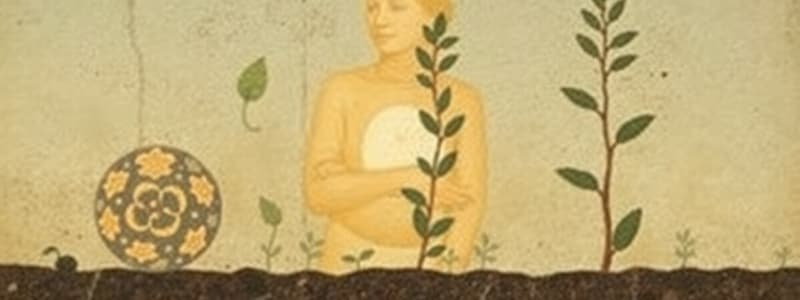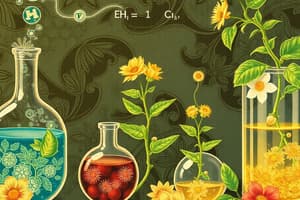Podcast
Questions and Answers
What are the reactants in the formation of water?
What are the reactants in the formation of water?
- H₂O and O₂
- H₂ and O₂ (correct)
- O₂ and CO₂
- H₂ and H₂O
Chemical reactions create or destroy matter.
Chemical reactions create or destroy matter.
False (B)
What process do plants use to convert carbon dioxide and water into glucose and oxygen?
What process do plants use to convert carbon dioxide and water into glucose and oxygen?
Photosynthesis
Cohesion is much stronger for water than for other __________.
Cohesion is much stronger for water than for other __________.
Match the following terms to their definitions:
Match the following terms to their definitions:
What must happen to hydrogen bonds to raise the temperature of water?
What must happen to hydrogen bonds to raise the temperature of water?
Water's hydrogen bonds help to stabilize ocean temperatures.
Water's hydrogen bonds help to stabilize ocean temperatures.
What happens to the temperature of the remaining liquid when a substance evaporates?
What happens to the temperature of the remaining liquid when a substance evaporates?
Water is less dense as a solid than as a __________.
Water is less dense as a solid than as a __________.
What is the process called when thermal energy is transferred from a warmer to a cooler body?
What is the process called when thermal energy is transferred from a warmer to a cooler body?
Study Notes
Chemical Reactions
- Formation of water (H₂ + O₂ → H₂O) exemplifies a chemical reaction.
- Reactants, hydrogen and oxygen, rearrange to form the product, water.
- Matter is neither created nor destroyed in chemical reactions; only rearranged.
- Photosynthesis is a vital chemical reaction converting carbon dioxide and water into glucose and oxygen, powered by sunlight.
Water’s Life-Supporting Properties
Cohesion and Adhesion
- Cohesion refers to the tendency of water molecules to stick together, stronger in water than in most other liquids.
- Cohesion aids plants in transporting water and nutrients from roots to leaves.
- Adhesion is the tendency of different kinds of molecules to stick together.
Surface Tension
- Surface tension reflects how difficult it is to break the surface of a liquid, heavily influenced by hydrogen bonding.
- Water's high surface tension allows insects like water striders to walk on its surface without sinking.
Temperature Moderation
- Thermal energy relates to the random movement of atoms; heat transfers from warmer to cooler substances.
- Raising water temperature requires breaking hydrogen bonds, absorbing significant heat.
- Cooling causes the formation of hydrogen bonds, releasing heat into the environment.
- Earth’s water supply helps moderate temperatures, creating suitable conditions for life.
- Water’s temperature resistance stabilizes ocean temperatures, beneficial for marine ecosystems.
Evaporative Cooling
- Evaporative cooling occurs when the fastest-moving molecules escape from a liquid, leaving behind cooler molecules and lowering the temperature of the remaining liquid.
Density of Ice
- Water exists in three states: gas, liquid, and solid.
- Ice is less dense than liquid water due to hydrogen bonding, enabling it to float, which is crucial for aquatic life by insulating the water below.
Studying That Suits You
Use AI to generate personalized quizzes and flashcards to suit your learning preferences.
Description
This quiz focuses on key concepts from the study of chemical reactions in biological processes, particularly the formation of water and photosynthesis. It highlights the importance of reactants and products, and the principle that matter is neither created nor destroyed in these reactions. Test your knowledge on these essential biological chemical reactions!




